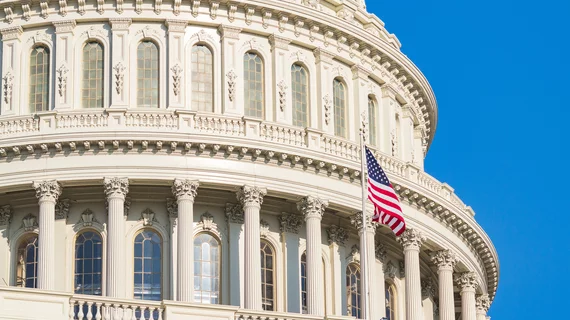Physician lawmaker introduces bipartisan bill to avert $450M in forthcoming Medicare cuts to radiology
A physician and U.S. congressman has introduced bipartisan legislation to avert hundreds of millions in forthcoming cuts to radiology and other specialties.
Rep. Michael Burgess, MD, R-Texas, and cosponsor Rep. Bobby Rush, D-Ill., are proposing to temporarily waive budget neutrality requirements for one year under the Medicare Physician Fee Schedule. Absent such action, diagnostic radiology stands to lose some $450 million in reimbursement next year alone, according to an analysis commissioned by the ACR.
Rush and congressional colleagues first placed these cuts in their crosshairs in August, calling reductions to physician pay during a pandemic “reckless” and “ill conceived.” The American College of Radiology on Wednesday said H.R. 8505 would provide a “critical reprieve” from forthcoming financial pressure.
“Introduction of the bill represents a positive step in the ongoing effort to highlight the expected negative impact of the looming cuts and spur congressional intervention before the end of the year,” ACR wrote in an Oct. 7 news update to members.
The college and numerous other provider groups have intensified pressure on lawmakers in recent weeks, hoping for action. Just Monday, ACR and a coalition representing 1.4 million physicians and other practitioners sent a stern letter to CMS Administrator Seema Verma, “strenuously” objecting to the payment changes. Others signing the note included the American Society of Neuroradiology, the Society of Interventional Radiology, and the Alliance for Physical Therapy Quality and Innovation.
The latter praised the proposal on Wednesday, noting that it would still allow scheduled payment increases for primary care and other physician office visits to go into effect. CMS has planned to boost pay for these evaluation and management services by $5 billion, requiring offsetting cuts in the 2021 budget.
“Even before the COVID-19 pandemic hit, Medicare’s proposed cuts to specialty providers threatened to impose severe financial constraints on practices and undermine patient access to the critical care services they need … ” Nikesh Patel, executive director of APTQI, said in a statement. “This bipartisan legislation would go a long way towards removing the existential pressures specialty providers currently face, while ensuring we remain financially viable during the pandemic so we can continue serving our Medicare patients."
Reps. Rush and Burgess first introduced the bill on Oct. 2, and it has been referred to multiple House committees for consideration.
Earlier this week, the Radiology Business Management Association estimated that 50% of radiology practices would be forced to reduce staffing to counter the reimbursement reductions.

